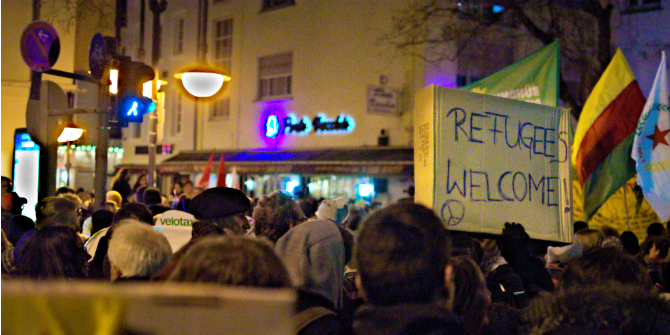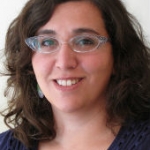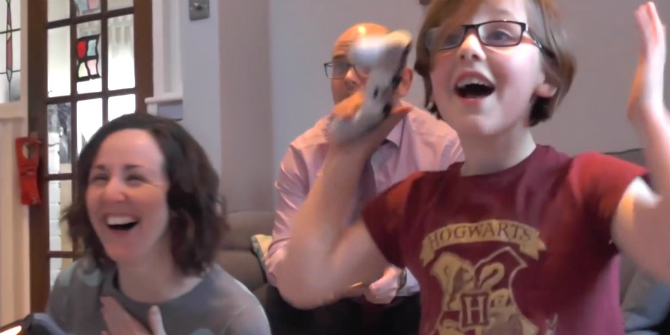 Credit: L. Royal, CC BY-NC-ND 2.0
Credit: L. Royal, CC BY-NC-ND 2.0
 As a mother herself, Alicia Blum-Ross reflects on the upsetting and powerful images of three-year old Syrian refugee Alan whose body was washed onto a beach in Turkey last week. She finds that Alan’s death triggers our own sense of vulnerability as parents which is also a call to action. Alicia is a researcher at the LSE’s Department of Media and Communications. She is interested in youth media production and is part of the Parenting for a Digital Future research project.
As a mother herself, Alicia Blum-Ross reflects on the upsetting and powerful images of three-year old Syrian refugee Alan whose body was washed onto a beach in Turkey last week. She finds that Alan’s death triggers our own sense of vulnerability as parents which is also a call to action. Alicia is a researcher at the LSE’s Department of Media and Communications. She is interested in youth media production and is part of the Parenting for a Digital Future research project.
It has been a few days since the deeply upsetting picture of Syrian three-year-old Alan Kurdi (originally reported as Aylan) lying drowned on a beach in Turkey began circulating rapidly on social media. Few can have failed to see the images of the boy resting on the edge of the surf, and being carried away by a Turkish police officer. Much has already been written about the impact this image has had on changing the narrative about the current Syrian refugee crisis in Europe, in the Middle East and in North America.
My own visceral response to this image, like that of many others, is bound up with my identity as a parent, especially as a parent of toddlers. The vision of his small body, his limbs sprawling as he is cradled to the policeman’s chest, has returned to me over and over again as I’ve carried my own children to bed. I can feel the weight of him in my arms.
That Alan’s death is particularly moving to me and to others because it triggers our own sense of vulnerability as parents is, in a horribly sad but important way, a call to action. It forces politicians to at least respond to calls for a re-thinking of the current inadequate response to the refugee crisis, and to do so because they recognise the tragedy as parents. UK Prime Minister David Cameron and Turkish Prime Minister Recep Tayyp Erdogan both made points of responding to the image of Alan Kurdi as a father and grandfather respectively, but whether this translates into a meaningful change remains to be seen. And indeed, what this change can and should look like is up for debate.
Children have long been some of the most potent symbols of humanitarian disaster and the impact of human rights violations. While images of suffering children can galvanize action, they can also be used as tools for political gain. Equally parents, mothers in particular, have long been agents for political change. The long vigil of the Mothers of the Plaza de Mayo who demanded justice for their children in Argentina is but one of many examples where mothers were able to demand rights and accountability where other forms of political action had failed.
But the mothers in Argentina were mothers demanding justice for their own children. How do certain images, like that of Alan, address our common humanity as parents and ask us to advocate on behalf of the children of those we will never know? The hope is that this image helps us recognise Alan, and by extension his family and other Syrian refugees, indeed not as ‘others’ but as people whom we all bear responsibility. As Lilie Chouliaraki has described, this type of personalised image invites us to belong to an imagined global village where we care for each other’s children as our own. Chouliaraki distinguishes between moments where the media exoticise the suffering of distant others by depersonalising disasters as spectacle, as opposed to the few but vital moments in which they serve to create a ‘cosmopolitan imagination’ where we believe ourselves to live in a world in which we should and can make a difference.
The task, as Shani Orgad and Bruna Seu explored through research with humanitarian communications workers and the public, is to try to create intimacy at a distance. In qualitative focus groups and interviews with 182 members of the British public, Seu and Orgad found that while most people were aware of on-going humanitarian and international development issues, they struggled to maintain a sense of ‘ongoing and meaningful connectedness.’ People are unable to act if they cannot connect emotionally with the images of others they see, or if they feel overwhelmed by the scale of suffering. But, as Sam Gregory from WITNESS wrote, images can sometimes ‘break through the chatter, incite discussion and mobilise change’
Which is why the terrible familiarity of the image of Alan Kurdi invites rare but powerful identification. He could be my child, I think, what can I do?
In an interview with Abdullah Kurdi, Alan’s father, he said
My children were the most beautiful children in the world. Is there anybody in the world for whom their child is not the most precious thing?
The universality of the experience of parenting is a means of connection. It is far too early to know what impact this single death will have on the wider discussion around Syria or refugees in Europe. But for many of us the experience of emotional identification with Alan and his family is a first step towards some kind of action.





